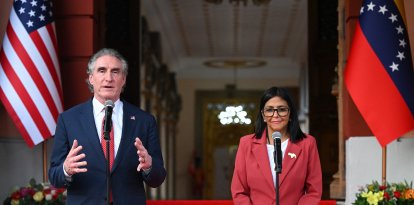The Department of Defense announces that the United States will reduce its military presence in Syria
This withdrawal would reduce the number of U.S. troops in Syria to less than 1,000 in the coming months.

U.S. soldier in front of a Bradley IFV in Syria.
The U.S. Department of Defense (DOD) announced Friday that President Donald Trump's administration will reduce the number of troops currently deployed in Syria following the degradation of the terrorist group Islamic State, also known as ISIS. In a statement, Pentagon chief spokesman Sean Parnell detailed that this withdrawal would reduce the number of U.S. troops in Syria to less than 1,000 in the coming months. Parnell added that such action would be executed in compliance with a directive issued by Defense Secretary Pete Hegseth to "consolidat[e]…the U.S. forces in Syria under the Combined Joint Task Force – Operation Inherent Resolve to select locations in Syria."
The Pentagon's chief spokesman also detailed that "This consolidation reflects the significant steps we have made toward degrading ISIS’ appeal and operational capability regionally and globally." Similarly, Parnell explained that the Global Coalition to Defeat ISIS has managed to materialize "significant gains, including those that led to the territorial defeat of ISIS in 2019. In addition, the U.S. Central Command (CENTCOM) "has made major gains, including those that led to the territorial defeat of ISIS in 2019. Additionally, U.S. Central Command [CENTCOM] has launched dozens of airstrikes over the last year to further degrade ISIS capabilities and deny them the ability to regain strength."
Death of al-Baghdadi and ISIS expansion across the region
At the end of his statement, the spokesman noted that CENTCOM was fully prepared to execute offensive operations against the remnants of the jihadist group, adding that DOD would continue to work with coalition partners not only to continue to pressure ISIS, but also to confront against any other terrorist threat in the world. "The threat of terrorism is not confined to the Middle East, and we will be vigilant across every continent to ensure that ISIS has nowhere to hide," Parnell concluded.
The Trump administration's decision comes six years after the neutralization of ISIS leader and founder Abu Bakr al-Baghdadi in northern Syria was orchestrated during the Republican leader's first term in office. Although at the time this action represented a blow strong enough to weaken the terrorist group substantially, it began to gain strength during the administration of former President Joe Biden, to the point that it managed to expand its operations to other countries in the region.
























